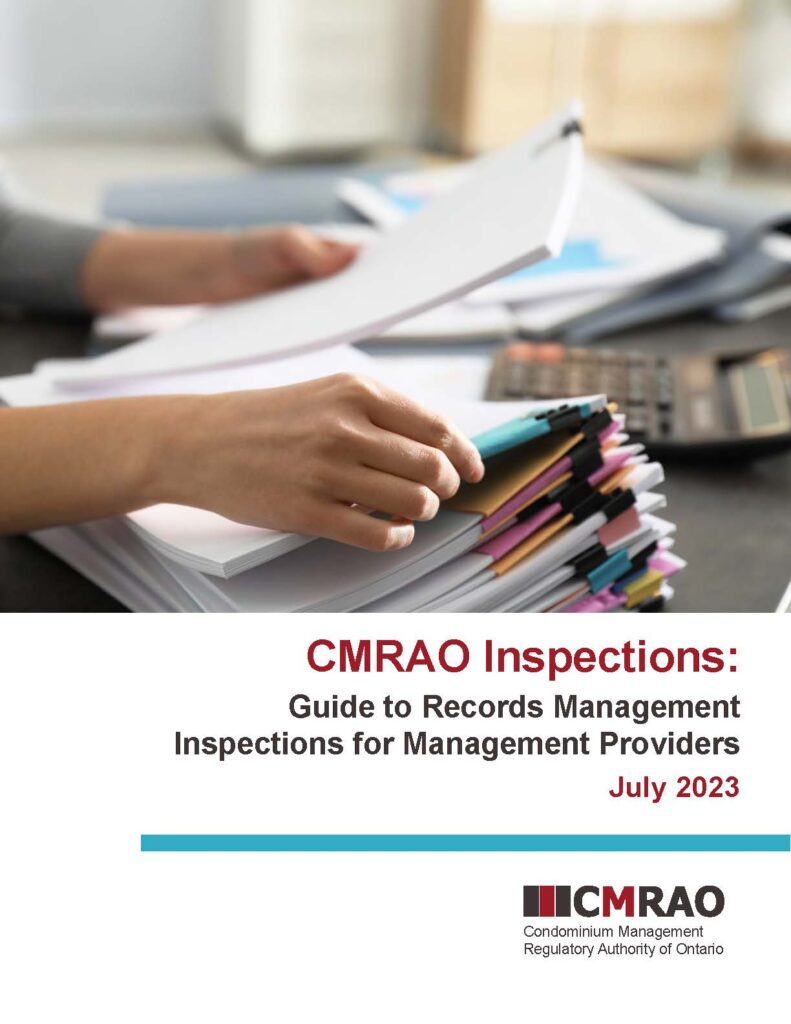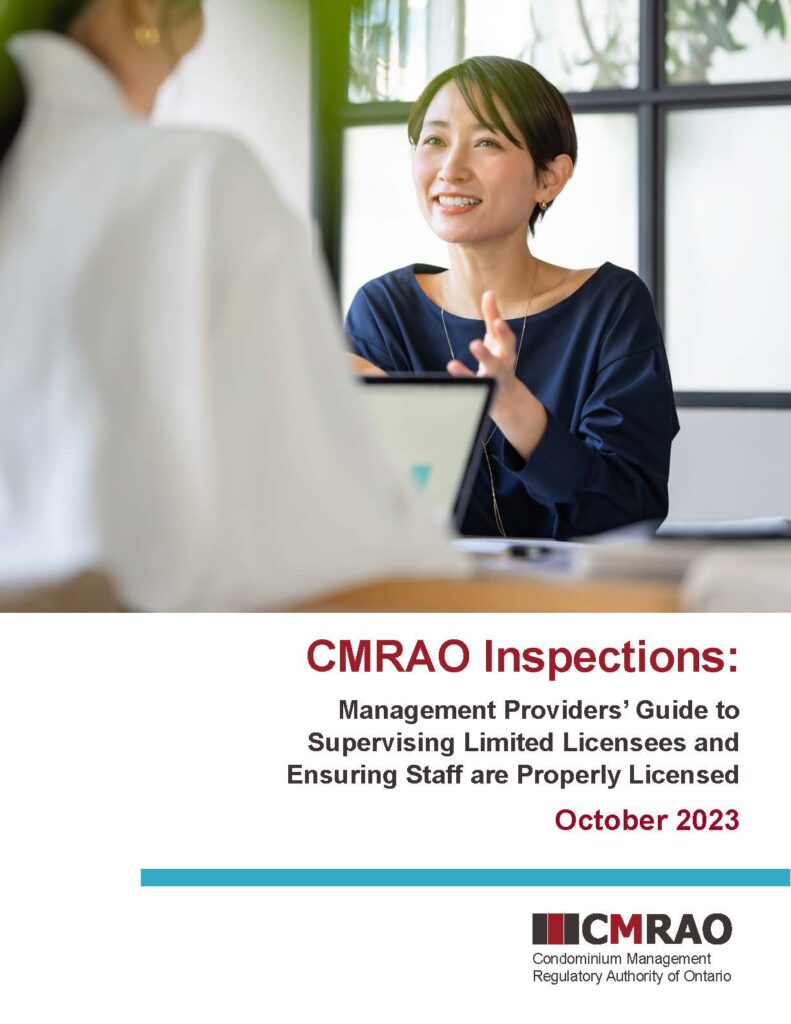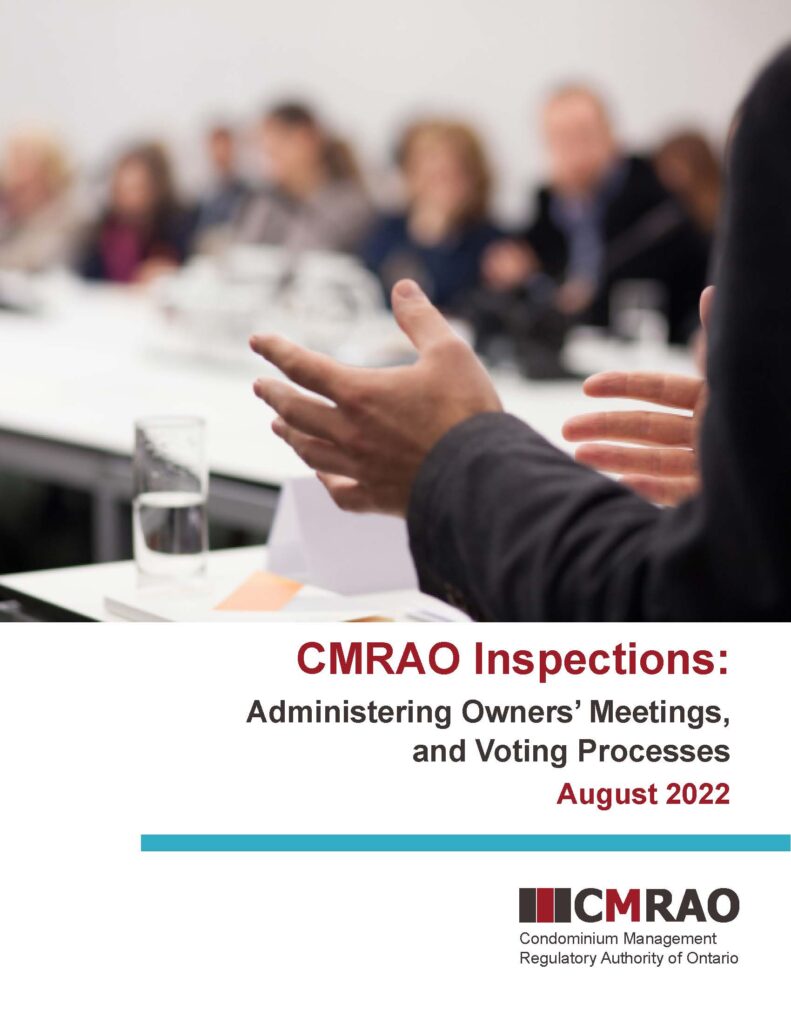Inspections Program
The CMRAO’s risk-based inspections program monitors and confirms that condominium managers and provider businesses are complying with key requirements under the Condominium Management Services Act, 2015 (CMSA) and its regulations.
In its first years of operation, the CMRAO conducted inspections of licensees in response to complaints alleging serious types of misconduct resulting in numerous regulatory actions, including the revocation and suspension of licences. These inspections have focused on a broad range of areas of non-compliance with the CMSA, including:
- Misappropriating money and allegations of fraud
- Withholding or failing to turn over records and/or money to a client after termination of the management contract
- Interfering with the election of condominium directors and misuse of proxy forms
- Keeping poor records or non-existent records management practices
- Condoning unlicensed practice and employing unlicensed individuals
- Breaching the conditions of a licence
- Other types of dishonourable or unprofessional conduct
The CMRAO has broadened its compliance program to include proactive standardized inspections of licensees. These inspections focus on key areas, including:
- Records management practices, including records turnover processes
- Administration of owners’ meetings and elections, including the use of proxy forms
- Declaration of conflicts of interest to a client’s Board of Directors
- Supervision of Limited Licensees, and ensuring that a provider’s staff are properly licensed
- Written contract with all clients
These inspections provided the CMRAO with valuable insight into the providers’ operations, training, records management, and processes. The Report on the CMRAO’s Inspections Pilot Program outlines the scope and key findings.
The CMRAO performs inspections on a range of small, medium, and large provider businesses from different areas of the province. Some licensees are selected for inspection at random, although others may be selected based on other factors.
Although the Registrar of the CMRAO reserves the right to take regulatory action in relation to an inspection, the purpose of proactive inspections is to review a licensee’s businesses practice and to ensure compliance with the governing legislation. At the end of the inspection, the licensee receives a report that notes areas for improvement. Follow-up reviews are be conducted as appropriate.
Inspections Program Guides
The following guides provide an overview of the CMRAO’s processes and what to expect for a particular type of inspection. These documents will also give licensees an opportunity to review their business practices in order to comply with requirements and prepare for a possible inspection. During an inspection, the inspector will use templates to gather information from licensees.
As new guides are developed for other focus areas of inspections, they will be posted here.

Download Inspections: Guide to Records Management Inspections for Management Providers
[PDF - 1,233 KB]

[PDF - 664 KB]
Frequently Asked Questions
How does the CMRAO have the authority to conduct inspections of licensees?
Section 59 of the Condominium Management Services Act, 2015 (CMSA) gives the Registrar of the CMRAO the authority to appoint inspectors for the purpose of conducting inspections
What authority do inspectors have?
While carrying out an inspection, an inspector:
- is entitled to free access to all money, valuables, documents, and records of the person being inspected that are relevant to the inspection;
- may make reasonable inquiries of any person, orally or in writing, with respect to anything relevant to the inspection;
- may require a person to produce any document or record relevant to the inspection and to provide whatever assistance is reasonably necessary, including using any data storage, processing or retrieval device or system to produce, in any form, the document or record;
- may use any data storage, processing or retrieval device or system used to engage in activities of a licensee in order to produce information that is relevant to the inspection and that is in any form; and
- may, upon giving a receipt for them, remove for examination and copy anything relevant to the inspection, including any data storage disk or other retrieval device in order to produce information, but shall promptly return to the person being inspected the thing that was removed.
What kind of cooperation is expected?
If an inspector requires a person to produce a document or record and/or provide assistance, the person is required to produce the document or record and/or provide the assistance, as the case may be. It is also illegal for a person to obstruct an inspector conducting an inspection or withhold from the inspector or conceal, alter, or destroy any money, documents, or records that are relevant to the inspection.
Do other regulators conduct proactive inspections of their licensees/members?
Yes. It is common for professional regulatory bodies to conduct routine inspections of their licensees/members.
Who can be selected for a “proactive” inspection?
Any licensee can be selected for an inspection. Although the CMRAO uses a “risk-based” approach for selecting licensees for inspections, the selection model may evolve over time. The CMRAO conducts inspections of condominium managers and management provider businesses of various sizes from across the province. Some licensees may also be selected for inspections based on observed trends, previous complaints, or other factors.
If a manager or provider business is the subject of an inspection, does that mean they’ve done something wrong?
No. Although the CMRAO may select certain licensees for inspection based on prior infractions, many licensees are selected randomly.

